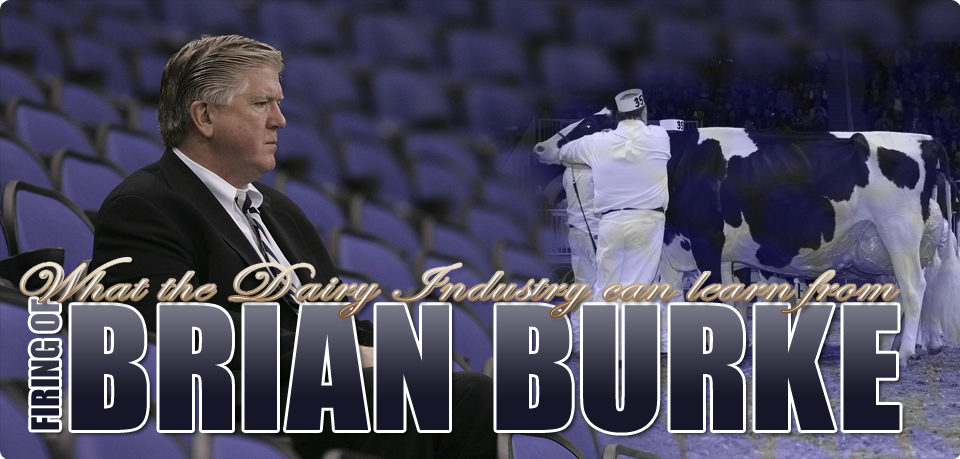Hockey fans, which most dairy farmers are, know Brian Burke as the guy with the permanently askew necktie and reddish face, and a plug of chewing tobacco planted firmly beneath his cheek and gums as he stared down at his hockey team from the general manager’s box in the press level at the Air Canada Centre, chirping at opposing teams or on-ice officials and urging on his Toronto Maple Leafs. They also know him as the guy who talked a good game but failed to deliver a competent goaltender and overspent for players. Something far too familiar to many dairy industry executives. Burke was fired this week.
The thing that many dairy farmers need to realize from this scenario is that dairy farming, just as hockey is a results oriented business. Just like hockey, when someone is not performing, change is needed. When Burke was ushered in to Toronto many fans were already planning the Stanley Cup parade down Yonge Street. The problem is it never materialized. Similar to the announcements of many dairy industry executives.
Leadership starts at the Board Level
The same can be said of many dairy organizations. New leadership comes in and it seems to take a long time to see any change, and even longer for the boards that preside over these organizations to realize it’s not working and enact change. Take a look at the Leafs, the board at the time when Burke was hired, was comprised of mostly hockey fans (Ontario Teachers’ Pension Plan owned the Leafs as much for the PR value with membership as they did for ROI). Then about a year ago Canada’s two media giants, Rogers and Bell, teamed up to purchase the majority stake in the Leafs for $1.07 billion, with official transfer happening in late August. As one of their first moves, though delayed by the lockout, the very results driven board decided that Burke was not the man to lead them forward. He’s gone.
This is one area that I think many of the dairy breeder boards (Breeds, Milk Recording, A.I., Milk Marketing etc.) do not do a good job of. While everyone likes to be everyone’s friend, management must be held accountable for results. This is its very mandate that every board should hold itself to. Now I know that in many cases breeders tenure on these boards is short (something many big corporate boards would never allow), so the ability to bring about change can be hard. However, it is also why I think as an industry we need to look closer at how we comprise these boards.
While there is no doubt I believe the breeders should be represented, it can also be very helpful to have people from outside the industry on these boards. Any good board needs to have its stakeholders (the breeders) on its board. However, it’s also important to bring non-investor (non-breeder) who has outside perspectives to the board. Typically this means bringing people from financial, legal and organizational growth to the table. This will help in bringing a more balanced approach to growing the organization.
Blue and White Disease
For all his performance shortcomings, there were certainly things about Brian Burke’s tenure that I have a great deal of respect for. One thing is the way in which he worked at getting rid of the “blue and white” disease. This was the clever phrase Brian used to slam the culture of entitlement they believed every Leaf was stricken with. We see this in many dairy organizations, where staff and board members seem to have a sense of entitlement just because of their position with that organization. They seem immune to the performance and accountability that all employees and boards should feel as paid or elected representatives of a public or co-operative organization.
Now I understand that there is a time and a place for different styles of leadership. At times, it is better to lead from the rear than the front. No questions asked. However, much like William Wallace (Braveheart) and Maximus (Gladiator) there is also a time that you need to lead your organization from the front, leading the fight at risk of firing or in Wallace and Maximus case even death. That is what it is going to take to win. In a time where there was no superstar capable of being the front man for the Leafs, Burke took the heat and stood up for the organization. (Don’t even get me started on Kessel, whose trade may be the one biggest mistake Burke made that ultimately cost him his job). Now he may have partly done it out of ego, but when the organization or even certain players were under severe scrutiny (which happens a lot in the hockey crazed city of Toronto), Burke stepped up and took the heat, something that earned him a great deal of respect from all internal staff and players. This is one thing I see severely missing in the dairy industry. At one time there were people like Moe Freeman, Roy Snyder and George Clemons, that when it was needed stepped up and led from the front lines.
The Bullvine Bottom Line
The dairy industry is stricken by its own Blue and White disease. The sense of entitlement held by many of its breeder organizations is staggering. These organizations need to be accountable for performance, and when performance metrics are not met, heads need to roll. Currently, there is rising uncertainty, due to changes in consumer demand, marketplace decline and genomics. It is time for leaders to step up to the plate. It is time to lead from the front. It is time for accountability. Brian Burke accepted that leadership responsibility. He was willing to risk it all, knowing that performance would dictate his fate. Can dairy breeders expect the same from our boards and leaders?

















Leave a Reply
You must be logged in to post a comment.